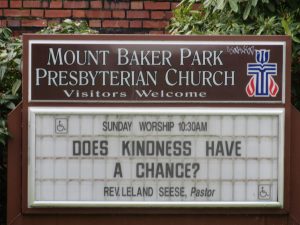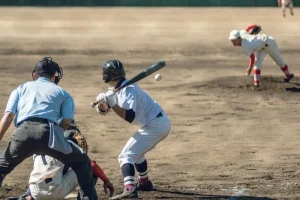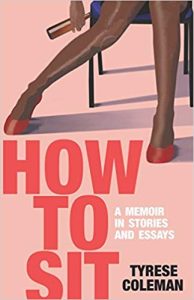The signboard outside my neighborhood church got my attention: “Does kindness have a chance?”
Isn’t that what we’re all wondering these days?
Last month’s horrific attacks in Paris staged by the militant group ISIL, followed by the tragic murder of fourteen Americans in San Bernadino by a husband and wife team of ISIL sympathizers, has stirred anti-Muslim vitriol not seen in our country since 9-11. While Donald Trump touts a ban on Muslim immigration on the presidential campaign trail, violence against Americans perceived to be Muslim is at an all-time high. Here in Seattle, where I live with my husband and our three young teenagers, police are investigating the death of Hamza Warsame, a 17-year-old Somali-American boy. Hamza, a Muslim, fell from a 60-foot balcony at a local college last weekend. Many suspect he was beaten by white classmates, then pushed.
The thought of a brutal hate crime occurring in my city, perpetrated by kids just a few years older than my own, is wrenching. As parents, we all hope to instill a sense of kindness in our children, but what does that look like in the real world? The Oxford Dictionary defines kindness as “the quality of being friendly, generous, and considerate.” Does teaching kids kindness mean reminding the little ones to say please, thank you, and share with others? Does it involve telling children not to bully? Does teaching kindness encompass teaching tolerance of people who are different from them, and from us?
I would argue that parents need to take those lessons even further. We must cultivate a deeper form of kindness within our children, and ourselves. The greatest barrier to kindness in our country right now isn’t a propensity for cruelty; it’s fear. Fear crushes friendliness, generosity, and consideration. Fear of rejection, fear of difference, fear of harm, fear of loss – those fears make us dangerous to one another. Fear makes us willing to turn away from our ideals, and reject the tired, the poor, and the hungry. Fear makes us cruel.
I believe that, as parents, we must try to model a form of courageous kindness. Our kids need to see us stretching beyond politeness toward genuine engagement with others. They need to witness us going beyond the “tolerance” of people of other races, religions, and backgrounds, to celebrating and learning from those differences. They need to see us embracing a diverse circle of friends. They need to observe us showing empathy for others, and affirming the dignity and worth of every human being. Our country, and our world, feels like it’s starving right now for the collective nourishment that flows from the kindness of connection and engagement.
As I write this, I fear that I’m sounding idealistic and more than a little preachy. Am I a saintly paragon of kindness for my children to emulate? Not at all. But I try, and something I observed in my neighborhood recently spurred me to try harder. We live in South Seattle, the same part of the city that Hamza Warsame called home, an area we sought out for its diversity. A couple of days ago I was driving down Martin Luther Kind Jr Way when I stopped at a crosswalk for an African mother and her children. The woman wore a long, colorful dress and a hijab, as did her small daughter, but it was her son’s outfit that truly caught my eye. The boy, about seven years old, was sporting a red, white, and blue sweater, with stars dotting one sleeve and stripes running down the other. As I watched the trio head for the park across the street, I couldn’t help but imagine the boy’s sweater as an immigrant mother’s heartbreaking plea for friendliness, for generosity, for consideration. I tried to catch the woman’s eye to offer a smile, but she remained focused on her children. As I drove away, I silently wished her well.
Later that night, I spoke to my own kids about standing with our Muslim neighbors. I told them about Hamza’s death, and though their school community is known for being warm and welcoming, I asked them to keep an eye out for their Muslim classmates, just in case. Does kindness have a chance in these volatile times? I believe it does, if we, and our children, are brave enough to stand up to the ugliness. Kindness always has a chance, if only we are brave enough to give it away.




